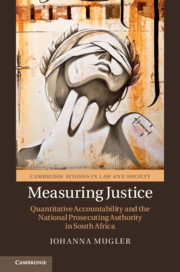 Measuring Justice
Measuring Justice Making Sense of Misleading or Imperfect NPA Conviction Rates
Published online by Cambridge University Press: 22 June 2019
When the old apartheid prosecuting authority was transformed and the first new National Prosecuting Authority was established in 1998, one of the main objectives of the new NPA leadership was to legitimise the power of prosecutors in the eyes of those they had until recently suppressed. They envisioned prosecutors, as I mentioned before, as ‘lawyers for the people’ (Barrell and Soggott 1998; Schönteich 2001: 1). To be accountable became an important and desirable good in that transformation process.
Are the NPA and the prosecutorial profession accountable today? Are they more accountable than before 1994? While I showed in Chapter 1 that the accountability mechanism governing the NPA and its employees has been clearly diversified and intensified since 1998, I also argued at various stages of this book that whether accountability has been rendered depends to a large extent on the involved actors’ understandings of the concept.
To save this book to your Kindle, first ensure no-reply@cambridge.org is added to your Approved Personal Document E-mail List under your Personal Document Settings on the Manage Your Content and Devices page of your Amazon account. Then enter the ‘name’ part of your Kindle email address below. Find out more about saving to your Kindle.
Note you can select to save to either the @free.kindle.com or @kindle.com variations. ‘@free.kindle.com’ emails are free but can only be saved to your device when it is connected to wi-fi. ‘@kindle.com’ emails can be delivered even when you are not connected to wi-fi, but note that service fees apply.
Find out more about the Kindle Personal Document Service.
To save content items to your account, please confirm that you agree to abide by our usage policies. If this is the first time you use this feature, you will be asked to authorise Cambridge Core to connect with your account. Find out more about saving content to Dropbox.
To save content items to your account, please confirm that you agree to abide by our usage policies. If this is the first time you use this feature, you will be asked to authorise Cambridge Core to connect with your account. Find out more about saving content to Google Drive.